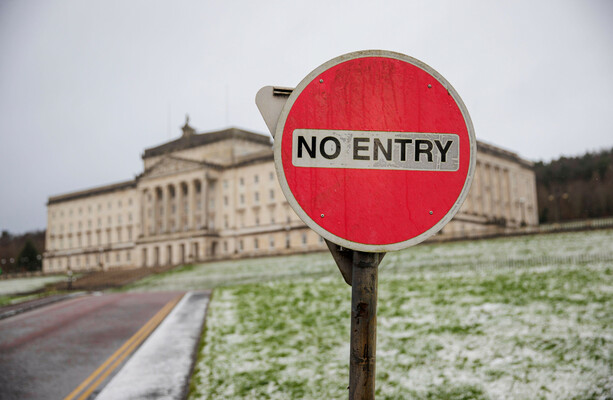Too often, politics in the North is determined and decided by its winter theater; Through their endless games of negotiations and conversations.
Too often, politics here is a story of blackouts rather than power sharing; The power outage means the absence of the government.
This could be the case for years. Stormont in the dark. Political armor.
We are in another one of those crises, but it doesn’t feel like a crisis. Because here failure has been normalized.
Ridicule has become acceptable.
We are very understanding when it comes to a policy that doesn’t work.
There is a “what kind” attitude to the lack of effective government.
Conversations that say and do the same things, and that go around in circles, are treated as news, even when there is nothing new to say.
But our story is not just about the collapse of Stormont, but about wider damage. Everything breaks underneath.
Tomorrow thousands and thousands of workers will go on strike.
Services are collapsing.
For too long the people who hold this place together have been taken for granted.
The strikes are an expression of this anger.
No government, no money
The UK government has offered a financial package to help improve things.
Now it seems like we’re playing one of those political games, waiting to see who will blink first.
Foreign Secretary Chris Heaton-Harris is sticking to the idea that the financial offer of more than £3bn is linked to an executive being in office.
In other words, without government there is no money.
One-party talks
Complicating matters is the fact that for several months, and then for several months, the UK government has been involved in one-party talks with the Democratic Unionist Party.
These issues relate to trying to resolve differences over post-Brexit trade deals; Agreements that unionists believe treat Northern Ireland differently to the rest of the United Kingdom.
There has been talk of a constitutional crisis, but not that Brexit is the cause.
One-party talks in Northern Ireland have not worked. It certainly hasn’t worked up to this point.
While Sir Geoffrey Donaldson speaks of significant progress, he is not yet in a position to return his party to executive power.
Frustration is heard in the voices of other leaders.
Ulster unionist Doug Beattie compared the talks with Heaton-Harris on Monday to “a bit like an evening between teachers and parents telling us how we are doing”.
He didn’t describe any movement at all and said nothing had changed.
Beattie told political journalist James Gould on Cool FM that he had asked “several times” for the details of those conversations to be shared with the DUP so that others would have “a better understanding of this”, but that did not happen. not yet.
Plan B
There is no sense of any major backup plan, no turning point or turning point in these conversations.
More time is always plan B, leaving Northern Ireland in the no man’s land between devolution and direct rule from London.
There is no bold initiative. There is no real pressure. There seems to be no desire to put a nail in the door at Stormont; The fear is that to do so would be to accept the failure of the political and peace processes here. It is a process that is seen in the eyes of the rest of the world as something that works, but it does not work. Certainly not the political part.
There will be more plays before the week is over, but as long as we normalize this nonsense nothing will change.
Stormont is not worth having for the sake of Stormont. It’s not worth the effort. Not unless something changes.
When something doesn’t work, you have to fix it.
We need an architect, a leader, someone who can think of this place outside of its chaos.
Brian Rowan Journalist and author. He is a former BBC Belfast correspondent. Brian is the author of several books on the Northern Ireland peace process. His new book, Living with Ghosts, is now available from Merrion Press.
2024-01-18 05:22:21
#politics #place #story #power #outages #power #sharing

